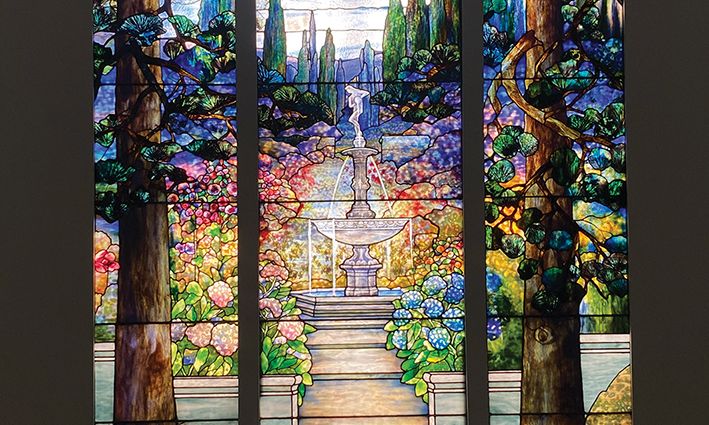Garden Landscape window (1912) by Agnes Northrop, Tiffany Studios
Courtesy of the Metropolitan Museum of Art
After inheriting her husband’s coal business, the Pennsylvania philanthropist Sarah Cochran (1857-1936) channelled her wealth and influence into supporting women’s suffrage. In 1911-13, she built Linden Hall, a Tudor Revival mansion with a monumental stained-glass window from the celebrated Tiffany Studios. Depicting a lush flowering garden akin to Cochran’s own, the window has a new home at the Metropolitan Museum of Art, where it will be installed in November for the centenary of the American Wing. It has been attributed to Tiffany’s leading female designer, Agnes Northrop, whose watercolour sketch of the central panel is also in the museum’s collection. The Met’s curator of American decorative arts, Alice Cooney Frelinghuysen, describes the window as a “masterpiece” that was “conceived, commissioned and crafted by women”.
Madonna di Via Pietrapiana (around 1450-55) by Donatello
Courtesy of Museo Nazionale del Bargello
The last remaining Donatello in private hands has joined the renowned holdings of sculptures by the Renaissance master at the Bargello museum in Florence. The terracotta relief of the Madonna and child takes its name from the street in Florence where it was displayed for centuries in a tabernacle on the façade of a building. Attributed to Donatello in 1986 by the art historian Charles Avery, the sculpture was removed for safekeeping and replaced with a copy in 2010. The Italian culture ministry used its right of pre-emption to buy the work for €1.2m in 2021. After what the museum called “a long and complex administrative procedure”, the acquisition for the Bargello’s Hall of Donatello was finally completed in November.
Blues Dance (2023) by Claudette Johnson
Photo: Andy Keate, © the artist, courtesy of the artist and Hollybush Gardens
Claudette Johnson created this larger-than-life pastel, watercolour and gouache drawing for her current exhibition at London’s Courtauld Gallery (until 14 January). Home to European masterworks from Michelangelo to Cézanne, the Courtauld has acquired Blues Dance as part of its efforts to represent more contemporary art. Since her involvement with the BLK Art Group in the 1980s, Johnson has made works asserting the presence of Black female figures in response to their marginalisation through art history. Of the Courtauld’s new acquisition, supported by the Garcia Family Foundation and the Samuel Courtauld Trust, she says: “It’s good to know that there will be another story being told about women, Black women and Black people that will encourage questions about the stories that prevail within the canon of Western art history.”

